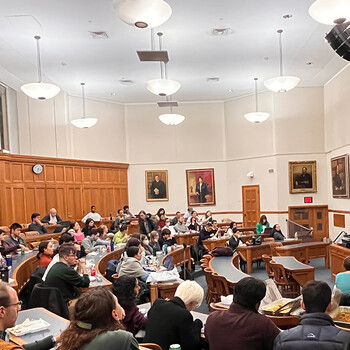Solomon Center Co-Hosts Panel on Future of Reproductive Rights and Advocacy

The Solomon Center for Health Law and Policy and the Information Society Project’s Program for the Study of Reproductive Justice co-sponsored a panel on Jan. 23 on the future of abortion rights and reproductive justice advocacy in the wake of Dobbs v. Jackson Women’s Health, the U.S. Supreme Court decision overturning Roe v. Wade.

The panel included three Yale Law School experts: Clinical Lecturer in Law Linda Greenhouse ’78 MSL, Anne Urowsky Professor of Law Douglas NeJaime, and Nicholas deB. Katzenbach Professor of Law Reva Siegel. They were joined by Melissa Murray ’02, Frederick I. and Grace Stokes Professor of Law at NYU School of Law. Solomon Center Executive Director Katherine Kraschel moderated the discussion.
The panel took place one day after the 50th anniversary of the Supreme Court’s decision in Roe, but the discussion was largely forward-looking. Panelists covered issues including new goals and strategies that will best serve the reproductive justice movement, new arenas where advocates should focus the fight for abortion access and the relative likelihood of success in these arenas. They also discussed new arguments to further the goals of equality and reproductive justice after Dobbs and new audiences that advocates should be addressing. In addition, the panel touched on the influence of the Dobbs decision on other substantive due process rights and social movements.


